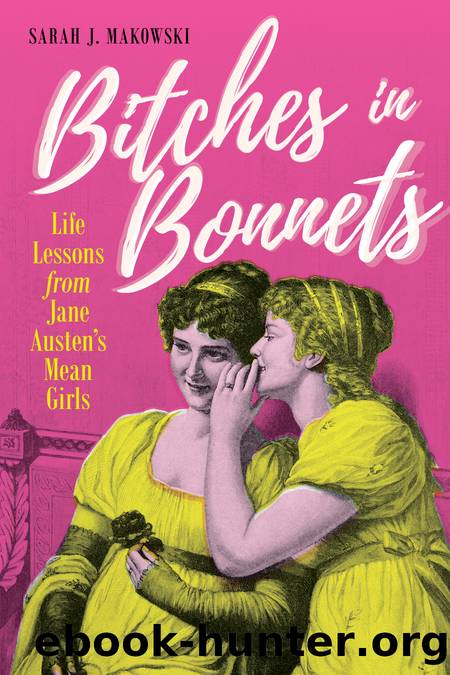Bitches in Bonnets by Sarah J. Makowski

Author:Sarah J. Makowski
Language: eng
Format: epub
Publisher: Prometheus
Published: 2022-11-29T00:00:00+00:00
ONE-SIDED FRIENDSHIP ISNâT FRIENDSHIP
The skewed association between Augusta and Jane parallels that of Emma and Harriet; both are unbalanced in their own way. Neither Jane nor Harriet can expect a bright, barrier-free future. Their self-appointed patronesses, Emma and Augusta, each suffer from an inflated sense of grandeur. What better way to shine than taking care of the disadvantaged, especially those who arenât dirty, diseased, or in any way displeasing? What better way for the vicarâs new wife to settle in than to spend time with lonely, single girls who present no threat? By âassisting and befriendingâ Jane, Augusta can be reminded every day of her narrow escape from spinsterhood.
Unlike Harrietâs delight at Emmaâs attentions, Jane has no use for the overbearing Mrs. Elton. That doesnât bother her. Ignoring the young womanâs protests, Augusta persists in broadcasting Janeâs dire prospects to the outside world. Ignoring the orphanâs polite resistance, Augusta informs Jane of the life she should now begin living, the type of position she should seek, and which forms of work would be acceptable to her âfriends.â As a Queen Bee, Augusta misses the mark. She has no hold over the intelligent and accomplished Jane. Any power and gratitude Augusta hopes to receive by finding Miss Fairfax employment are nonexistent.
In her examination of minor female characters, Women and Value in Jane Austenâs Novels: Settling, Speculating, and Superfluity, literature professor Lynda A. Hall claims that Mrs. Elton uses her attentions to Jane and her aunt âas a mark of financial superiorityâ and a way to build cultural capital in Highbury. Although she brought her own educational and monetary assets to the village, Mrs. Elton means to elevate herself by aiding the impoverished ladies, going so far as to call herself âLady Patroness.â This sentiment, along with her role as the vicarâs wife, earn her local favor and the gratitude of local chatterbox Miss Bates.
Augustaâs biggest reward for her efforts is having a legitimate, convenient excuse for avoiding her nemesis, Emma. Insisting on identifying a position of genteel servitude for her assumed protégé, Mrs. Elton whisks Jane aside for half-whispered confidences at public gatherings. Although she cannot persuade Jane to follow her guidance, her attentions allow her to dodge Emma and Harriet. Our flawed heroine watches the pairâs exchanges with a sense of pity and understanding. Herself a Queen Bee, Emma immediately spots Augustaâs perpetual, unwelcome assault of condescending âpraise, encouragement, and offers of service.â
No good can come from Emma and Augustaâs misguided patronage of Highburyâs distressed damsels.
Why am I so hard on Emma?
Of all of Austenâs heroines, why have I singled her out the most?
Itâs because she has everything that (most of us) have been brought up to think that we want. Sheâs the ideal. Not only is she pretty, but she is pampered and prosperous. Unlike the Elinors, Elizabeths, Fannys, or Catherines of the world, she has choices in life. Her family and upbringing afford her an amount of status and power, unlike her peers.
Her worst crime? Behind her beautiful clothes and proper manners, Emma is complicit in harming other women.
Download
This site does not store any files on its server. We only index and link to content provided by other sites. Please contact the content providers to delete copyright contents if any and email us, we'll remove relevant links or contents immediately.
4 3 2 1: A Novel by Paul Auster(12393)
The handmaid's tale by Margaret Atwood(7764)
Giovanni's Room by James Baldwin(7346)
Asking the Right Questions: A Guide to Critical Thinking by M. Neil Browne & Stuart M. Keeley(5775)
Big Magic: Creative Living Beyond Fear by Elizabeth Gilbert(5774)
Ego Is the Enemy by Ryan Holiday(5450)
The Body: A Guide for Occupants by Bill Bryson(5097)
On Writing A Memoir of the Craft by Stephen King(4944)
Ken Follett - World without end by Ken Follett(4734)
Adulting by Kelly Williams Brown(4574)
Bluets by Maggie Nelson(4559)
Eat That Frog! by Brian Tracy(4540)
Guilty Pleasures by Laurell K Hamilton(4449)
The Poetry of Pablo Neruda by Pablo Neruda(4109)
Alive: The Story of the Andes Survivors by Piers Paul Read(4033)
White Noise - A Novel by Don DeLillo(4011)
Fingerprints of the Gods by Graham Hancock(4004)
The Book of Joy by Dalai Lama(3986)
The Bookshop by Penelope Fitzgerald(3854)
